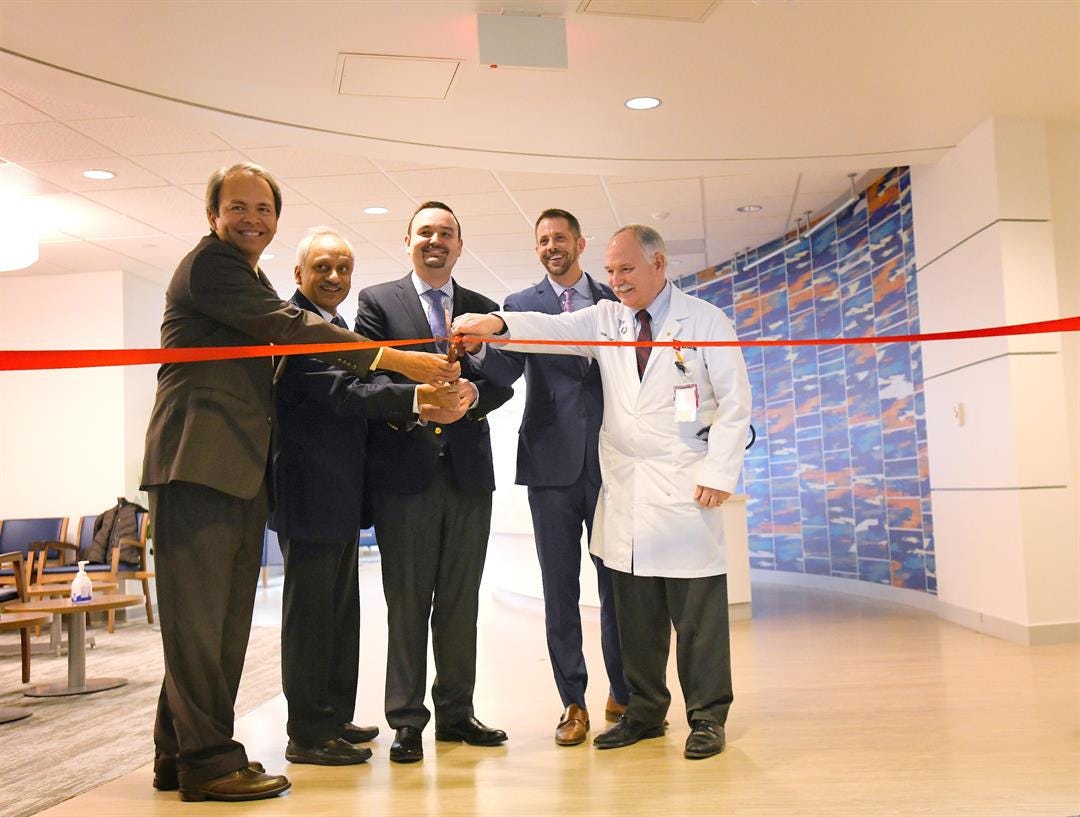Cancer Gets Personal at IU Health Precision Genomics
 IU Precision Genomics leaders cut the ribbon to open a new clinic inside the Simon Cancer Center in Indianapolis.
IU Precision Genomics leaders cut the ribbon to open a new clinic inside the Simon Cancer Center in Indianapolis.
Subscriber Benefit
As a subscriber you can listen to articles at work, in the car, or while you work out. Subscribe NowA building doesn’t make a center, but the early and swift success of a young cancer treatment program at Indiana University Health demanded more space. IU Health Precision Genomics focuses on patients with late-stage cancer who have exhausted standard treatment options, and the program recently moved into a new center that is opening the door to more patients. Indianapolis resident Gwen Brack credits the new approach to cancer treatment for saving her life after she was diagnosed in her twenties with a colorectal cancer that was slowly beating down her body.
Brack says her college student life was “completely turned upside down” when doctors diagnosed her with late-stage colorectal cancer when she was just 21 years old. She had success with standard treatments, but it wasn’t long-lasting; the cancer repeatedly came back and spread to multiple organs.
The elusive disease demanded a different treatment—something more personal—and that’s what IU Health says precision genomics offers. The only program of its kind in Indiana, it sequences a patient’s entire genome, which is 22,000 genes, and the patient’s tumor to create “a hyper-personalized” treatment plan.
“There are 22,000 genes that tell our bodies what to do; it’s the blueprint for how we operate as a person,” says IU Health Precision Genomics Executive Director Will Hundley. “Precision genomics looks at those 22,000 individual genes and says, ‘This gene is causing this problem for Will. Is there anything we can do to that specific gene to improve Will’s cancer diagnosis?’”
Hundley says other programs typically only analyze about 360 genes, but notes IU Health Precision Genomics is one of only a few in the nation sequencing the entire genome. A study authored by the program’s leaders showed that 43 percent of patients with late-stage cancer who were treated with precision genomics showed meaningful improvement in survival without progression of cancer, compared to just 5 percent of patients with late-stage cancer who were treated with non-precision guided therapy.
Patients with stage three or four cancer who have not had success with traditional treatment are referred to the program by their oncologists. After a patient’s personal genome is sequenced and the tumor’s genetics analyzed, Hundley says a panel of experts—“unbelievably talented people”—examines each case individually and recommends a treatment plan.
“These 20 thought leaders are a multitude of oncologists with different specialties, folks from radiology and the pathology lab. It’s another unique feature of our program—that a patient and their information is presented to such a prestigious group of folks for final analysis and sign-off on the action plan,” says Hundley. “They are so fond of being together as a group that it just has a momentum and life of its own that’s really productive for patients.”
The program started informally in 2014 and by 2017 was working with 400 to 500 patients. In early 2018, the health system invested in new space to continue growing precision genomics. It recently opened a clinic inside the Simon Cancer Center in Indianapolis; leaders expect the expansion will enable the program to work with about 650 patients in 2018. The growth includes satellite locations in Lafayette, Bloomington, Muncie and Carmel.
Hundley says, because the precision genomics field is in its infancy and the “science is changing daily,” patients will undergo standard cancer treatments first.
“We’re very early in the journey. In oncology right now, we know about 600 of the genes and their implications in the disease state,” says Hundley. “New clinical trials now are gene-based, instead of location-based; in the past, there would’ve been a breast cancer trial, now, there will be a gene trial based on a specific gene. The amount of information is changing every day, and those studies are just ramping up to a critical mass.”
For Brack, precision genomics uncovered a shocking solution: a simple daily dose of aspirin is a more effective treatment for her cancer than chemotherapy. She’s been cancer-free for one year.
“[Aspirin] is something that has been shown to work for my particular cancer—not just any colorectal cancer, but mine,” says Brack. “Hope is an integral part of the precision genomics program; it’s that next chance when you’ve exhausted the protocol drugs. It’s given me hope, given me a future, and literally, is life-saving. It’s going to change the future of cancer medicine.”
Brack says she found it comforting that a panel of experts analyzed her case to find the best treatment for her personally.
Hundley says it’s inexpensive for a patient to go through the precision genomics process.
Hundley says the center also emphasizes research.
